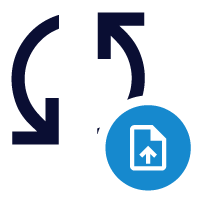Guide
Sales and Use Taxes
In this guide
- What are Sales and Use Taxes
- How do I calculate my sales tax obligation?
- Audits and notices
- Sales Tax Automation
- How do I know if my current sales tax solution is the right one for my business?
- Is it important to have a partner for sales tax?
- Can sales tax issues impact my ability to conduct business?
- Are there sales tax concerns specific to manufacturers?
- Are there specific sales tax concerns specific to retailers?
- Are there specific sales tax concerns for software providers?
- Additional resources
What are Sales and Use Taxes?
Sales Tax is defined as a tax on the sale, transfer, or exchange of a taxable item or service and generally applies on the sale to the end user or ultimate consumer. These are generally added to the sales price and is charged to the purchaser.
Use Tax is defined as a tax on the storage, use, or consumption of a taxable item or service on which no sales tax has been paid. Use tax is a complementary or compensating tax and does not apply if the sales tax was charged.
How do I calculate my sales tax obligation?
Select the state in which you operate to determine the current tax rate.
Audits and Notices
What is a Sales Tax Notice?
A tax notice is a letter that you receive from a tax jurisdiction letting you know about a requirement, an adjustment, or an error involving your tax account.
What are Common Causes for a Sales Tax Notice?
We’ve previously discussed key things to keep in mind if your business receive a notice, but what could potentially cause your organization to receive one? Knowing the common causes for a notice won’t guarantee that your business will never receive one. However, being able to prepare for receiving one can help ensure a smooth recovery process.
Four common tax notice causes are:

Data or technology mishaps
Updated rates and/or rules can be extremely difficult to keep track of, especially if businesses are relying on manual updates. States could make changes to their sales tax holidays, adjust their economic nexus requirements or have varying jurisdictions within the same state. Not having the right technology in place to keep track of those changes could create problems for companies.
For example, integration of any software solution requires that it be integrated properly in terms of product/service mapping. Even if your tax engine is accurate and working with your software, it needs to apply the right tax logic to the right products.
Exemption certificates also must be filed correctly, but it is important to make sure that each exempt invoice is associated with the correct certification. Exemption certificates may also need to be updated when necessary.

New or changing filing requirements
Businesses must also ensure they are properly registering and remitting sales tax where necessary. A filing frequency change that went unnoticed could also lead to a notice, as well as failure to account for any pre-payment status needs being overlooked.

Filing and remittance errors
As previously mentioned, manual processes lead to a greater risk of human error. Organizations may face late, incomplete or incorrect data on returns. The actual tax due versus the payment amount not matching up could also cause a notice being sent to a business.

Physical nexus, economic nexus changes
Post-Wayfair, companies are not necessarily required to have physical presence in a state for nexus. However, physical presence can still create nexus. Employees, inventory, kiosks, offices, stores, trade show attendance, warehouses and other physical ties to a state could all create physical presence nexus for an organization.
Meanwhile, economic nexus is created through a certain number of sales and/or transactions occurring in a state or through a marketplace facilitator.
After you understand the cause of your notice, determine action steps needed to respond to the notice. For filing status changes, be sure to update internal records and/or processes. With filing errors, submit any additional information, provide proof of payment/filing, re-submit the return(s) and amend the return(s) if necessary.
Don’t be afraid to lean on advisory expertise for addressing a sales tax notice. This could include your company’s legal and/or tax departments or a partner. Finally, be sure to resolve notice(s) with the individual states.
Hopefully, notices will not be a regular part of your business’ operations. But knowing how to prepare for them and what to do after the fact will go a long way towards helping you to bounce back quickly.
What do I do if I get a sales tax notice?
Have you ever received a tax notice from a state department of revenue? Whether you answered yes or no, there are important things to keep top of mind to help keep your business prepared.
Finding out that you have failed to comply with one or more of your tax obligations can be startling. However, resolving the issue quickly can save you from incurring more penalties.
Remember: it’s impossible to eliminate risk entirely. Instead, it’s more about minimizing liability and exposure and being ready when a notice does arrive.
Recognize an actual tax notice
The actual notice that you receive, notifying your company of a missed tax obligation, can be called various names.
These include, but are not necessarily limited to, the following:






Understand why you received the notice
Not all notices mean that your business has done something wrong. There are some that are informational or simply asking for your organization to send more data. Different types of notices could include:







Due to the variability involving notices and the ways they may arise, it is crucial that you understand what the notice is regarding and what is needed to resolve it.
The cost of doing nothing
Should a business opt to not take any action regarding a received notice, it’s important to understand the potential consequences. For example, this could lead to liens or the revocation of a license. It may also impact the attractiveness and value of the company when you are looking to sell.
Remember that making a mistake with your filings is one thing, but ignoring a notice is entirely different. It could make your company – and even the industry in which you operate – a bigger target for an audit. Furthermore, an auditor can take your inaction into account when conducting an audit. No business can guarantee that it never encounters an audit, but it’s not beneficial to ignore basic steps that can help to prevent them. A typical audit can take 30 to 45 days and cost companies anywhere from $100,000 to $300,000.
Overall, receiving a notice is not the end of the world. Be sure to contact whichever state agency that sent it – is this automatic? Was it triggered by a system delay or is something actually wrong? You can determine whether or not your company still owes taxes or if a mistake was made. While stressful, it could be worth it to find out as much information as you can to know exactly how to move forward.
How do I minimize my risk of a sales tax audit?
Preventing an audit is the best policy to have in place, versus reacting to an audit. However, when auditors do come knocking, businesses want to be able to quickly and easily find the needed documentation. When you have the right sales tax automation tools and processes in place, the chances of getting audited are less and the process of responding to those audits is easier.
Here are three key steps to minimize the risk of an audit – and will help keep you prepared for the possibility of an audit taking place.
Communication between tax and IT teams
Communication is key for minimizing audit risk, especially between the tax and IT teams. For example, the tax team should know about the company’s cloud strategy and if there are any upcoming changes to transactional systems (e.g., ERP, ecommerce, P2P). Comparatively, IT should know how much time is being spent on tax, where manual work could be reduced and if there is a plan in place to migrate or modernize the accounting system.
Having a “tax dream team” ensures all systems are updated in a timely fashion and business changes with tax implications are addressed immediately. This can only happen if all teams are working with one another toward the common goal of avoiding an audit.
Implement an adaptable strategy
It will also be key to have a strategy that can evolve with your business over time. Tax is evolving – your company needs to keep up. Furthermore, as your organization makes changes (e.g., adds a new product line, expands into new territories), there will be new considerations.
For example, nexus – both physical and economic – must be accounted for. Sovos’ 2022 State of Sales and Use Tax report found that nearly 800 tax bills are considered by state legislators each month. Additionally, the total number of jurisdictions within the U.S. grew 3.4% from 2021 to 2022, reaching 12,472.
At the beginning of 2023, every state with a sales tax has a rule in place that covers both physical presence and economic presence nexus. Details will vary from one state to the next, such as how long a business has to account for economic nexus when it crosses into a new jurisdiction. The right technology will keep pace with your business changes, helping to avoid the risk of an audit as new tax considerations start to impact the organization.
Prepare for the worst-case scenario
When it comes to preparing for audits, the best offense is a good defense. Businesses need to ensure they are ready before an audit actually takes place. A Sovos survey found that 80% of individuals who have responsibility for tax management/administration at their organization fear generating an audit or facing a financial penalty when remitting tax. Additionally, 18% said they worried about losing the confidence of their manager or even getting fired if they make a mistake.
However, here is where you can gain advantages with an automated sales tax solution. For example, when your business is audited it becomes easier to produce the needed documentation. It is also easier to support the audit inquiries from the specific jurisdiction.
Additionally, the right technology can ease the burden on internal teams. The majority (83%) of respondents said automating their organization’s tax management process would make them happier in their current role, and more likely to stay with the company. But just under two-thirds (62%) said their organization adopted new tech or systems in the past two to three years to combat the increasingly complex sales and use tax requirements.
Align tax and IT early to eliminate issues before they start, and to properly prepare for increased costs. The right partner can help ensure minimum interruption and maximum output, all while keeping your business compliant.
Sales Tax Automation
Can tax be managed manually, or do I need a software solution?
Managing sales and use tax can be complicated, complex and distracting for organizations, most notably small and medium sized businesses. Here, employees tasked with maintaining tax compliance are often not trained tax professionals, nor is this function considered a core job responsibility.
The pressure to stay on top of evolving sales and use tax requirements, while ensuring essential other responsibilities are not overlooked, is becoming a larger burden as the tax landscape continues to evolve rapidly. And it’s taking its toll on employees and businesses alike.
To measure the impact this function is having on companies, Sovos surveyed 250 individuals who have responsibility for tax management/administration at their organization. The findings reflect a level of concern and frustration to how this process is being navigated with some employees wondering if it may be time to seek other employment.
New technology can ease the burden on teams
The majority of those surveyed (83%) said automating their organization’s tax management process would make them happier in their current role, and they would be more likely to stay with the company. This is especially interesting as 62% of respondents stated their organization adopted new technology or systems in the past two to three years to combat the growing complexity of sales and use tax. This could speak to a lack of training on new systems or a lack of effectiveness the new systems have in managing the complexity of sales and use tax.
Economic nexus is now in play in nearly every U.S. state – South Dakota v. Wayfair, Inc. was three years ago at this point – and organizations cannot afford to ignore those changes. Businesses cannot assume that they are immune to increased scrutiny when it comes to sales and use tax.
Regulators are looking to close the tax gap, and with increased investment in digitization they now have the capabilities to expedite notices, audits, penalties and fines.
However, it might not always be an issue of purposefully overlooking sales and use tax obligations. SMBs often have employees who need to account for sales and use tax in addition to other job requirements. For example, more than one-third (35%) of respondents said that the growing complexity of tax distracts from core business priorities. Over 50% report seeing a strain on IT and other resources, while 13% said it leads to a stressful workplace and employee churn.
With nearly two-thirds of respondents saying that their current approach to tax management requires some level of IT assistance, the majority of SMBs could benefit from a different approach to sales and use tax technology.
Stuck between a rock and a hard place
When it comes to accounting for the most current sales and use tax, SMBs can be faced with an impossible situation. You don’t want to lose a sale, but do you still process that sale if you know the tax rate is wrong? That option could lead to fines or even audits. Or you may have to go back to the customer and reconcile the price difference, either returning money to them or telling the customer they owe more. Neither of those outcomes is ideal for your business. Furthermore, if you can’t process the sale, you may lose a customer to the competition permanently.
With that Catch-22 at play, nearly two-thirds of respondents understandably said that their level of anxiety as it pertains to tax was high or moderately high. There was also a 50/50 split over what the biggest organizational fear was when it comes to tax:
• Losing a sale/customer because you couldn’t correctly process the transaction
• Incorrectly processing a transaction with the wrong rates and the potential fallout
Eight out of 10 respondents reported that either generating an audit or facing a financial penalty was their biggest fear if a mistake was made when remitting taxes. Additionally, 18% said they were worried about losing the confidence of their manager or even getting fired if they make a mistake.
The ability to update changing sales and use tax rules in real or near real-time is also a problem for many organizations that are cutting into their efficiency. Less than one-third of businesses have the ability to update tax rates in a matter of hours, according to the survey. That can be a long time for transactions, especially with ever-evolving updates, such as changing sales tax holidays.
Are things really changing that fast? Toward the end of 2020, Sovos was tracking more than 684 bills that could change tax compliance requirements. For the same period in 2019, Sovos was tracking only 104 bills. Additionally, in early spring of 2021 Sovos was tracking as many as 2,148 proposed bills that could become law. Comparatively, that number was just 686 during the same time in 2020.
How bad has sales and use tax management gotten?
The survey found that 63% of respondents would rather go grocery shopping than manage their sales and use tax compliance processes. Just over half (51%) said they would rather do laundry, while a trip to the dentist (39%) and sitting in traffic (33%) were also top options instead of sales and use tax compliance management.
What are the benefits of sales tax automation software?

Improved operational efficiency
Centralizing your tax determination process can help remove redundancies, inefficient processes and the potential for human error that can occur with manually maintaining multiple systems.

Greater flexibility and control
Whether you expand into new jurisdictions or add a new product or service, embedding process controls in an automated system ensures increased ease of maintenance and better business enablement.

Clearly defined audit trails
Quickly find and share sales transaction details with internal and external auditors in a legible, easily understandable and consistent format.

Stronger insight into your data
Always know where you sold a product or service and to whom. Understand where your tax liabilities are, where you are overpaying or if you are paying tax to enhance reporting and insights.

Ability to refocus on business initiatives
Gain confidence in the process of managing sales tax requirements, researching nexus status and managing customer exemption certifications. Your company can then focus on continuing business growth rather than stressing over maintaining compliance.
How do I pick the right solution for my business?
Picking the right tax solution is not always apparent. Federal, state and local regulations can quickly change. Businesses evolve, whether through introducing new products and services or by expanding into new jurisdictions. Organizations must consider internal processes as well, ensuring that a tax solution helps–not hinders–daily operations. It’s also important to independently evaluate whether a cloud or hybrid-based tax engine is right for the business.
But how do you know which option is best suited for your company? Does it really matter what type of implementation process occurs?
Here are three solutions that could be the answer to ensuring your organization’s tax processes run smoothly and keep you compliant.

Standard rate file
What is a standard rate file?
This is a table containing pertinent rates for zip codes. These rates are applied to your solution and used in completing orders for your customers. Depending on your back-end system, you may not be able to integrate with a third party.
When is this solution best for me?
A standard rate file is an ideal sales tax solution if you are manually researching rates and updating your back-end systems, or if your business relies on IT to make those updates. This is often a low footprint for IT to pursue in relation to integrating the technology. The best cloud solutions can be subject to internet latency, so rate files can be a backup option for when you are offline.
What would it look like to utilize this tax solution?
Implementing a standard rate file requires someone (likely working in tax or IT) to download a file and upload into the system. It is necessary to troubleshoot the sales order process based on new changes.
Standard rate files assist with tax calculation, but businesses must consolidate all source channels to file accordingly and accurately.
Remember to check potential tax changes such as sales tax holidays, exemptions, fees and more as a rate file typically covers limited tax scenarios.

Tax determination engine
What is a tax determination engine?
A tax determination engine is a cloud solution that integrates directly to primary transaction systems to accurately determine rates, regardless the jurisdiction or product.
Organizations can utilize rate and form changes across all jurisdictions. This can be a scalable solution that evolves with your business. Tax engines can be offered as an on-premise, hybrid or cloud-based solution.
When is this solution best for me?
This is an ideal tax solution for businesses that are facing fresh complexities, such as new distribution channels, products and services.
A tax determination engine is best when you want consistent accuracy, regardless of how your business expands.
What would it look like to utilize this tax solution?
If you are using an on-premise tax engine, your process will be very similar to the rate file workflow. However, this experience drastically improves as access to more thorough tax logic can be accessed for even the trickiest of offline taxing.
If your organization uses a cloud-based solution, rate changes will be reflected immediately. In events like sales tax holidays, you can rest assured that you are covered for the correct items and period of time.
Having multi-threaded tax for your omni-channel experience can consolidate your tax details within one place to keep track of your nexus.

End-to-end compliance solution
What is an end-to-end compliance solution?
An end-to-end compliance solution refers to a connected suite of products that pass data to each other. Depending on the needs of an organization, this may include a tax engine, filing solution and exemption certificate management tool. The tools that track your taxable and exempt transactions can also consolidate directly into the filing details that populate your returns.
When is this solution best for me?
The end-to-end option is for businesses that are ready to optimize compliance tasks and introduce more efficiency into daily processes. It is also ideal if you are operating multiple transaction systems, or your channels need a single source of truth for tax.
End-to-end helps ensure growing exempt customer volumes are taxed appropriately. This option eliminates bottlenecks during research of taxing scenarios.
What would it look like to utilize this tax solution?
When an order is placed, your tax engine would calculate the appropriate rate based on jurisdictional rules. This engine would then pipe your transaction data and tax information into the filing solution, where your team has transparency into what data is flowing to your forms.
If applicable, your tax engine would also utilize your exemption certificate tool to apply any relevant customer exemptions.
Considering a New Sales Tax Software? Here are Seven Questions to Ask

Can the software scale to a global application?
Business is conducted all over the globe. If your tax software can’t account for international dealings, it is only solving a small portion of your tax problem.

What is their availability rating?
Understanding a vendor’s ability to ensure 24/7 uptime is critical in assessing whether they can meet the needs of your business. They can’t help you if they aren’t on.

Will the implementation process align with my priorities?
Getting the level of hands-on assistance you require and a timeline that makes sense for you should be the expectation.

How quickly does their support team respond to a problem?
We are talking about software. A problem is inevitable, but understanding a vendor’s response rate and MTTR is a priority.

Are you getting a fair price?
Nobody likes unpleasant surprises, especially when it comes to the cost of software licenses. Make sure you understand how pricing works for the complete solution before you sign on.

Is the software hands off?
How much work is required on your end? Do you need to be involved in every step? If the product isn’t automatically updating in real-time, you are at risk of being out of compliance.

How long until we see a benefit?
If you won’t see an immediate return on your investment it’s likely the wrong choice. Metrics you should use to evaluate include: a reduction in time spent filing on a monthly basis; improved audit assessment results and the amount of corrected sales tax charged incorrectly by vendors.
Do sales tax solutions have hidden IT costs?
They certainly can, when implementing a solution, it’s important to consider total cost of ownership (TCO). Here are the top five hidden IT costs when implementing a tax solution that you should be on the lookout for.

On-premise vs. SaaS
With more than 19,000 different tax jurisdictions globally, employing an on-premise or even single tenant “cloud” solution can require additional resources to update, increasing your TCO.

Reliability
Tax regulations are not optional or open to interpretation and correct calculations depend on specific information. Localized system delays or failures require IT assistance and add to your TCO.

Scalability
The technology you are evaluating may fit your needs and location today, but what about tomorrow? Ensuring your solution seamlessly scales along with your business needs is the best way to control costs.

Security
Tax transaction details often contain sensitive customer data. Extra time and resources dedicated to security patches to on-premise technology can quickly add up and the cost of not can be even higher.

Data Management
Greater oversight from regulators has made producing information quickly a must. Searching for data that should be readily available is inefficient and will quickly escalate the TCO of your solution.
Managing tax compliance successfully is essential for any organization. It can also be a high-maintenance activity for IT departments. By tapping into the power of the cloud, you can ensure your business is charging, collecting and remitting the proper level of tax, while dramatically reducing the burden placed on IT.
Can I move my sales tax operation to the cloud?
Moving from an on-premise tax engine to one in the cloud can help businesses better manage their tax obligations. Whether organizations need improved oversight and management of exemption certificates, an automated process for tracking ever-evolving regulatory changes or more comprehensive compliance reporting, a cloud migration project may be needed. However, there are several key considerations to help ensure as smooth of a process as possible.
What are the goals?
Businesses should have clear goals in mind before migrating to the cloud, knowing what improvements will come from the upgrade and how that will impact the short and long term. For example, are you looking to streamline end-to-end tax compliance? Reduce your total cost of ownership (TCO)? Do you need real-time tax updates for improved accuracy? Putting together a budget, team resources and an overall project plan will also help outline a clearer path to accomplishing business goals.
This is also where organizations should consider the benefits of a multi-channel tax engine. If there are multiple transaction channels (e.g., accounting, billing, customer facing), they will all need to be able to talk to the same tax engine. Additionally, if there are plans to operate globally, a business needs to ensure its tax engine can handle that geographic expansion.
Planning out goals is also a good opportunity to engage with a cross functional team to make sure all points of view are considered. All teams (IT, order-to-tax, AP) are going to have different goals and it will be critical to try and accomplish all goals over time.
What is the timeframe?
Companies should determine ahead of time whether migrating their tax engine to the cloud is being done in conjunction with other projects, such as a cloud ERP upgrade or IT modernization. A lot of testing items will likely be the same and it’s important to know whether another project that touches tax engine is also being adjusted.
Businesses must also know whether this is a standalone project. After the goals have been decided, it will be easier to determine a potential time frame and how long certain departments may be impacted by the migration. Oftentimes, organizations tie a cloud migration project to an ERP migration or the launch of a new consumer-facing channel. This could impact the overall time frame.
What is the project scope?
Considering the project scope is also essential. The scope should be a reflection of the goals that have been identified. For example, is it a technical upgrade? This would be when a business is not experiencing any limitations or having difficulties with calculating sales tax, but the company has decided to move to the cloud. Then there is a functional upgrade, which would mean that an organization was working to overcome some sort of limitation in its current sales tax system.
A technical upgrade would be a more basic transition. The business is not updating many features/functions and is likely working to achieve other efficiency goals. This can also be done as a first step toward more in-depth reconfiguration of a system farther down the line.
When a company is looking at a functional upgrade, it is essentially redesigning its entire tax strategy. Businesses must understand which scope it is looking at to ensure as smooth of a transition as possible.
Which resources are needed?
Internal resources also have to be considered. Companies may even want to create a roles and responsibilities matrix for the entire project. Laying out the project plan, which departments/individuals oversee each step and how those departments/individuals need to work together will help with the cloud migration.
Along with internal teams, there may need to be external consultants involved as well. Businesses should know ahead of time what sort of resources they may need from a third-party, such as the technology vendor.
Did you consider the details?
There will be numerous details that each business must review. For example, are there any touch points within an existing ERP system that must be considered? What about migrating data configurations, or jurisdiction code conversions? These details will likely vary from one business to the next, so ensure you are taking your daily operations into account.
The sales tax reporting process also must be considered. With cloud migration, there will be a change in process. Previously, there may have been processes to pull the data out. However, an automated tax system in the cloud can offer a more targeted and detailed report, without needing to query for a specific file. Instead of relying on the “old way” of reporting, businesses will need to account for new processes. Additionally, any type of add on solutions (e.g., exemption certificates) will also need to be accounted for as part of the migration.
Organizations also must have a plan for how they are going to access their archived data. For example, with sales and use tax audits, states can go back multiple years. Typically, completed transaction data is not migrated to the new solution – how is an organization going to make sure it still has access to the old data once it moves?
Migrating from an on-premise tax solution to a cloud-based engine may seem daunting. But accounting for key considerations and working with the right partner can keep the process seamless.
How do I know if my current sales tax solution is the right one for my business?
Recognizing that your current vendor is not working out as intended is never a pleasant experience. What’s worse is compounding the problem by not making a change. Here are five signs to look for that could indicate that it’s time for a change.

Reliability is slipping
Coverage for all compliance areas and geographies is the expectation. If your vendor is not meeting this level of service, consider new options.

My sales tax compliance vendor is unresponsive to problems
When things go wrong, they are nowhere to be found. Time to move on.

We are missing critical tax updates
You purchased tax software to keep you out of trouble, not get you into it. Upgrade now.

Hidden charges and price increases are out of control
Seem like you are paying for their business failures? A better deal is out there.

We are working harder than before
The idea was to make managing tax compliance easier and more efficient. Not harder. Send them packing.
Managing tax compliance successfully is essential for any organization. It can also be a high-maintenance activity for IT departments. By tapping into the power of the cloud, you can ensure your business is charging, collecting and remitting the proper level of tax, while dramatically reducing the burden placed on IT.
Is it important to have a partner for sales tax?
When it comes to tax compliance, having the right partnership in place is critical. Managing tax and compliance in today’s rapidly evolving regulatory environment takes expertise, vigilance and strong partners you can count on.
When looking for a partner, consider these essential five traits when considering your options.

A commitment to success
A partner committed to the long-term provides the flexibility and adaptability needed to traverse difficult times. Knowing who you can count on in tough times is critical.
Tip: ask for their average length customer engagement and verify through third parties when possible.

Trustworthiness/Transparency
Know the expected costs after the initial engagement. Learning of hidden fees or contract escalators after implementation is too late. Don’t fall for unrealistic offers upfront.
Tip: ask for a detailed breakdown of pricing structures in the contract.

Expertise
Tax and regulatory matters are complicated and require experienced professionals. Make sure your partner has the regulatory qualifications to provide the right guidance.
Tip: inquire into their regulatory expertise. What does the team consist of? How do they monitor?

Responsiveness
When you have a question it’s important that your inquiry receives a prompt reply. Tax is a deadline driven activity, waiting days on end for your partner to address an issue is unacceptable.
Tip: nothing says more about a company than how they treat current customers, read the reviews.

Proactiveness
Changes in tax laws can come fast and furious. Your partner should be able to identify and eradicate potential issues before you before they become your problem.
Tip: they can’t keep you running if they go down, research how often their systems experience failures
Can tax issues impact my ability to conduct business?
Sales tax can absolutely be an inhibitor to your business. If you can’t meet a customer’s – or potential customer’s – needs because of your ability to calculate taxes, you are driving customers towards your competitors.
What if your tax calculation software takes too long to calculate tax at the point of transaction? Or maybe the calculation happens but it’s incorrect, meaning you will have to deal with adjustments after the fact.
Can a bad experience really impact current and future sales? Let’s take a look:
of consumers will consider switching to a competitor after just one or two bad experiences
of businesses lose customers to the competition when they don’t take customer retention seriously
of customers expect the rate of innovation from companies to accelerate
of customers expect companies to use existing technologies in new ways to create better experiences
Customers know that technology is evolving, and they expect businesses to keep pace and ensure that the latest technology can effectively help them. If your sales tax processes can’t maintain the pace of change, how can you expect to meet customer expectations and also ensure you stay compliant with all tax obligations?
Tax can be an inhibitor to your business, but it doesn’t have to be. A solution with always-on availability, unmatched performance and the most up-to-date system integration options will keep you ready every day of the year.
Are there sales tax concerns specific to manufacturers?
Yes, there are specific tax concerns that manufactures need to be aware of. As manufacturers learn to operate in an uncertain environment, they must understand how rapidly changing sales and use tax complexities impact their business operations. U.S.-based manufacturers and global manufacturers with a U.S. presence have especially high audit exposure – a risk that only grows with expansion. Additionally, economic nexus requirements are now ubiquitous and manufacturers making the ecommerce push must remain vigilant to stay compliant.
Knowing which questions to ask, and how tax rules apply to your business, are essential to understanding how to overcome these top tax challenges for manufacturers.
Here are the five most important Sales and Use Tax questions every manufacturer should be asking:

- How are manufacturers taxed in your home state?
- What types of manufacturing activities are included within the scope of any available exemption? R&D? Packaging? Pollution control?
- How completely must an item be used in a qualifying manufacturing process for an available exemption to apply (Exclusively? Predominantly?)?
- Has your organization negotiated a special tax rate?

- Have you provided your vendors current exemption certificates?
- Are your vendors correctly applying the exemptions to which you are entitled?
- Are you applying a “validation” step to ensure you’re not overpaying tax?

- Do you have a tax collection obligation in the states where your customers are located?
- Are your customers exempt?
- Are you collecting and maintaining exemption certificates?

- Are you aware of economic nexus standards?
- Do you understand the state-by-state nuances associated with economic nexus? Are you registering to collect tax once you cross the threshold?
- understand how your products are taxed across the country?

- Tax compliance for manufacturers is complex.
- There is a thin line between success and failure.
- Thorough compliance requires you consider your sales, purchase and certificate management processes.
Are there specific sales tax concerns specific to retailers?
Yes, along with trying to grow sales, revenue, and their customer base, retailers must contend with an evolving sales and use tax compliance landscape. The increased complexity associated with collecting and reporting on sales and use tax has led to more operational and compliance challenges for financial and accounting professionals within the retail industry.
A recent Sovos survey of U.S.-based, full-time finance and accounting decision makers at retail companies with annual revenues of $25 million+ finds that retailers face three major challenges related to sales and use tax compliance:
- Driving efficiency. Finance and accounting professionals often wear multiple hats and have limited resources and bandwidth.
- Increased complexity associated with an omnichannel environment in which customers are purchasing online, in-store, and across jurisdictional boundaries. The 2018 Wayfair decision, which found that states can collect tax on certain businesses even if they don’t have a physical presence in their jurisdictions, has only added more complexity for retailers.
- Tax rules make it more difficult for retailers to manage finance and accounting operations from a compliance and risk management standpoint.
Are there specific tax concerns for software providers?
Absolutely, sales and use tax compliance is a critical issue that software organizations must address to reduce their regulatory risks, increase operational efficiency and boost their bottom line. The U.S. software industry is evolving as are the current sales and use tax challenges faced by software organizations. Sovos recently completed a survey of software providers and here are some of the more interesting results:

Audits are increasing, as are their associated costs and penalties. In the last 12 months, 41% of software organizations have paid an annual audit penalty of $160K.

Improving operational efficiencies are challenging for professionals managing sales and use tax compliance. The survey found that 60% of finance/accounting and IT professionals spent one-quarter of their monthly time on sales and use tax compliance.

There is an increased shift towards cloud-based solutions. Eighty-three percent of respondents plan to migrate to the cloud in the next 24 months. Faster automated data feeds, database conversions and effective collaboration between different departments are helping to drive the shift.

Businesses need solutions that eliminate the reliance on manual data entry. Over two-thirds of respondents said they want scalable sales and use tax solutions with flexible deployment options and data security features.


















































